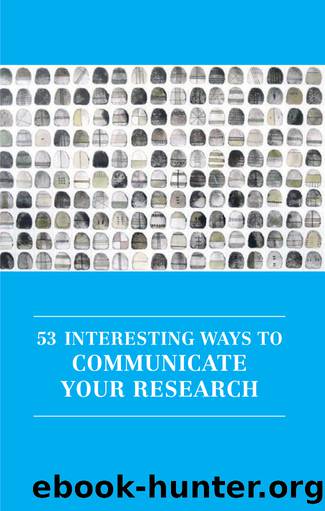53 Interesting Ways to Communicate Your Research by Daly Irenee;Brophy Haney Aoife;

Author:Daly, Irenee;Brophy Haney, Aoife; [Daly, Irenee]
Language: eng
Format: epub
ISBN: 1698821
Publisher: The Professional and Higher Partnership Ltd
27
Stand-up comedy for researchers
Researchers often have problems connecting with the public, especially groups that do not typically engage with âuniversityâ events. They also often find it difficult to think differently about their work, in ways that would make it more accessible to other people. One solution to this is to practise communicating research in a way that breaks down barriers between audience and speaker, positively thrives on looking at things from new angles, and for which feedback is immediate and honest â this format is stand-up comedy.
There are several ways to get started with doing research-based stand-up comedy â from signing up to an open spot in a comedy club (only recommended for people who actually want to break into comedy) to contacting the nearest Bright Club (http://www.brightclub.org/), or setting up something similar (recommended for everyone). Bright Club is a movement chiefly about comedy by researchers and many UK cities now have one, run by local groups of volunteers. They vary in operation, but typically involve six acts each doing about eight minutes of stand-up comedy about their own research in front of a paying audience that turns up to be entertained by a blend of jokes and interesting information. Shows have a professional comedian compère and set everything up to make it as easy as possible for the researchers, who usually have no prior experience of doing comedy. Bright Clubs normally provide some form of training to help with writing and performance in the lead-up to a show, and the audiences are friendly and encouraging. Bright Club is akin to doing a departmental research seminar prior to an international conference â a safe, supportive environment in which to start and get useful experience for other things. Unlike a typical departmental research seminar however, it is hugely enjoyable to do.
The most obvious difference between typical academic presentations and stand-up comedy is that, for stand-up to work, you must be the centre of attention. There are no projector slides, and no computer to hide behind. Stage presence and delivery are all important, but donât try to be someone else â take aspects of your own personality and amplify them. Observe how successful comedians stand, how they talk, how they structure their material, how they use rhythm and timing, and how they hold the microphone.
So, finally, how exactly do you do stand-up comedy about your research without appearing to devalue it, oversimplify, bend the truth, provoke controversy, or die on stage? People approach this in different ways, but one way is to treat it primarily as a public engagement exercise. What is it that you want to communicate? Pick one message, break it down into three or four elements, brainstorm keywords from those elements, and then start to think of funny things to link between those. This may seem daunting, but researchers have one huge advantage over everybody else: they all have something unique to them, and do not have to work hard to think of new jokes about well-worn topics. You
Download
This site does not store any files on its server. We only index and link to content provided by other sites. Please contact the content providers to delete copyright contents if any and email us, we'll remove relevant links or contents immediately.
The Future Internet by Bernard Marr(541)
Focus Group Methodology by Pranee Liamputtong(506)
Python for Finance Cookbook by Lewinson Eryk;(470)
Empowering Public Speaking by Deanna L. Fasset & Keith Nainby(436)
Doing business with Japan : successful strategies for intercultural communication by Kazuo Nishiyama(413)
Global Orders and Civilizations : Perspectives from History, Philosophy and International Relations by Sadik Unay; Muzaffer Senel(341)
Engaging with Ethics in International Criminological Research by Michael Adorjan Rose Ricciardelli(326)
Intentional Power: The 6 Essential Leadership Skills For Triple Bottom Line Impact by Lisen Stromberg & JeanAnn Nichols & Corey Jones(293)
Analysis of Financial Statements by Frank J. Fabozzi & Frank J. Fabozzi(289)
The Economics of Banking by Jin Cao(284)
The Three Skills of Top Trading by Hank Pruden(281)
Entrepreneurial Marketing by unknow(279)
Focus on Teaching by Jim Knight(263)
The Oxford Handbook of Banking and Financial History by Youssef Cassis;Richard S. Grossman;Catherine R. Schenk;(256)
Data Science and Analytics for SMEs: Consulting, Tools, Practical Use Cases by Afolabi Ibukun Tolulope(251)
New India by Arvind Panagariya(248)
Building a Career in Cybersecurity: The Strategy and Skills You Need to Succeed by Yuri Diogenes(241)
Financial Statement Analysis by Martin S. Fridson;Fernando Alvarez; & Fernando Alvarez(240)
Maximum Success with LinkedIn by Dan Sherman(226)
